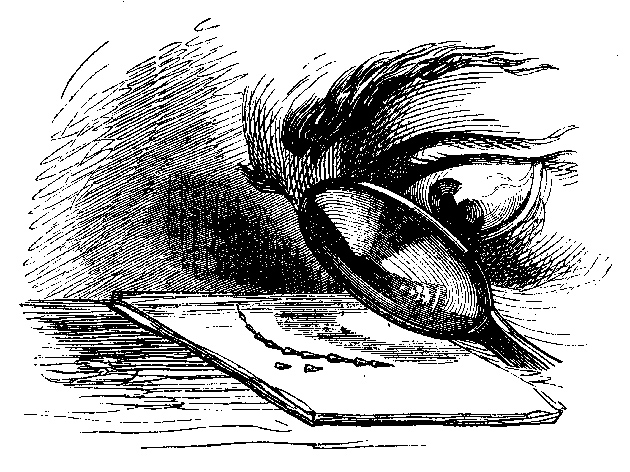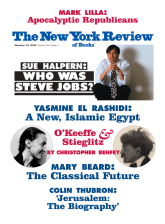In response to:
On 'The Stranger's Child' from the December 8, 2011 issue

To the Editors:
In his reply to Galen Strawson’s protest at his remarks about the Jewish characters in my novels [Letters, NYR, December 8, 2011], Daniel Mendelsohn writes, “I stand by my reading,” but his emphasis in fact falls differently from in his original review. There he created a vague but poisonous atmosphere of suggestion, with nothing quite spelled out, but the implication (felt by everyone I know who’s read the piece, in Britain and the United States) being of an anti-Semitic bias that undermined both the novel under review and its predecessor, The Line of Beauty. In his letter, however, he says he meant merely that I have unconsciously recreated British literary stereotypes of the Jew as rich, vulgar, or in some way “other.” He “wished” that the “arriviste” Duchess of Flintshire in The Line of Beauty hadn’t been born a Feingold, and that Gerald Fedden, the corrupt Tory MP, hadn’t married into a Jewish banking family.
Well, I don’t claim any originality in making my Rothschild-like Kesslers Jewish, but nor do I see that it would have made the least difference to the book’s moral critique if their racial background had been one approved in advance by Daniel Mendelsohn. He makes no sign, at least, of objecting to the even more “arriviste” Ouradis in the novel, or of finding them disappointing stereotypes of the Levantine merchant class. One of my concerns in The Line of Beauty was to illustrate some of the many waves of immigration to London, the German-Jewish Kesslers in the nineteenth century, the Lebanese Ouradis in the twentieth, as well as the less successful Jamaican family of Leo Charles, the first boyfriend of Nick Guest, the young protagonist. I am not at all embarrassed to suggest that Nick’s life, like that of Britain itself, is vitally enriched by all these more or less “distantly foreign” presences in it.
I have never thought of The Line of Beauty as primarily a satire—much less, as Mendelsohn does, “a work of biting social and political satire.” To me (if I may be forgiven for speaking so pompously about my own book) it is a tragicomic social novel, in which minor characters are inevitably treated more summarily than the principals, and often for comic effect. It may be worth pointing out that Sharon Flintshire is glimpsed only once across a room—she is otherwise an offstage figure, referred to half a dozen times in five hundred pages, and a wholly insubstantial support for any theory of Jewish-sponsored moral decay in the book.
Of course a number of the major characters in The Line of Beauty are Jewish, and the interest of their being so I hope plays a part in the novel’s social portrait. I would be keenly disappointed with myself if I believed that Lionel Kessler, his sister Rachel, and her children Catherine and Toby were mere stereotypes of the British Jew; I certainly saw them as individuals just as varied, complex, and interesting as the non-Jewish characters in the novel. They are just as integral to its social picture, whose subtleties (if I may say so) Mendelsohn flattens with his ingenious allegations of their being “markers of social decline.” To the young Nick Guest they are all figures of magnetic fascination and charm, and if those are stereotypical qualities, few I imagine would want to disavow them.
Really I want to protest that I am a good deal more “conscious” of what I am doing as a novelist than Mendelsohn, in his harmful and distressing way, has repeatedly alleged. In The Stranger’s Child, the Jewishness of the press photographer Jerry Goldblatt (in the section of the book set in 1926) is deployed precisely to illustrate the prejudicial attitudes of Dudley Valance, who speaks to him “in a harsh tone” and repeats his name in a way that strikes Dudley’s wife Daphne (through whose eyes this chapter is seen) as pointedly unpleasant. It is clear to the reader that Dudley has invited Goldblatt to the house, and is insulting him even as he uses him. To mistake this carefully staged vignette of historical prejudice for the unconscious habit of the author is so primitive an error as to cause some concern for Daniel Mendelsohn’s judgment.
Alan Hollinghurst
London, England
Daniel Mendelsohn replies:
Many readers will welcome Alan Hollinghurst’s explanation of the theme I have identified in his work. The only substantive part of his letter to which I want to reply is his opening insinuation that I have somehow changed my tune, and that I began with some nefarious desire to tar him as an anti-Semite and poison his reputation.
Had I seriously believed that Alan Hollinghurst was an anti-Semite or that anti-Jewish sentiment animated his work, I would have said so, using the diction and devoting the space appropriate to such an important charge; whatever he thinks of my judgments, I think that most readers of the Review would agree that they are not bashful. Instead, I wrote precisely what I thought: after rereading the author’s novels, I was dismayed and irritated by what seemed to me a clichéd presentation of Jewish characters as either rich or vulgar (or both), and by the noteworthy appearance of those characters at certain moments to mark the decline of a sentimental and traditional vision of Britain (an important theme, as I and other critics have noted, in The Stranger’s Child—and, as my review made clear, a troubling one, to my mind).
Advertisement
Precisely because it was inconceivable to me that a writer of Mr. Hollinghurst’s sophistication and evident sensitivity (qualities I have noted in my writing about his work) should deliberately recur to these stereotypes, I framed my observation about this motif as a “dismayed” comment about what I thought must be part of an “unconscious” regressiveness, a “lapse into an old British literary habit.” I had thought the examples I cited made it clear which habit I was referring to—the use of Jews to signal a falling away from a pristine Britishness—and I relegated this observation to a brief footnote precisely because the issue in question seemed to me to be a minor irritant rather than a major concern in the case of a writer for whose work my esteem is a matter of record—an esteem, indeed, I had counted on to allay any “poisonous” interpretation of the small point I was unhappily raising. It was clear, at any rate, that I was talking about a literary matter.
If I may say, certainly everyone I know in both the US and abroad who read this aside did so in precisely in the way I had intended; but when the philosopher Galen Strawson wrote his distraught letter taking umbrage at what he saw as an outright accusation of anti-Semitism against Mr. Hollinghurst, it seemed to require a clarification, which I provided in my letter of December 8. I am sorry that Alan Hollinghurst seems to think the latter was somehow disingenuous; it was not. My reading of this aspect of his work did not change from when I first commented on it in my review to when I elaborated on it in my response to Galen Strawson.
And I continue to stand by that reading. I must say that much of Mr. Hollinghurst’s defense, with its self-protective sarcasms, strikes me as disingenuous—his point about the Ouradis is otiose since, as far as I know, there is no long-standing British literary tradition of invidiously representing Lebanese people comparable to the tradition of thus representing Jews, and there are other specific points that I could rebut at length. (Whatever the Valances’ reception of Jerry Goldblatt may be intended to demonstrate, it was, as it were, the novel’s reception of him that struck me: in a work that does much to satirize and lament the crass process by which literary celebrity is manufactured, the representative of the intrusive popular press is clearly a Jew.)
But at this point readers may certainly judge for themselves. Alan Hollinghurst has now laid out his understanding of this aspect of his fiction, and I have repeatedly attempted to make my own reading of it—and my motivations for raising this point, and my means of presenting it—as clear as I can. If Alan Hollinghurst insists on believing that I acted out of a poisonous intent to malign him, there is little I can do to change his mind; I believe that a disinterested reading of my original note yields no such interpretation. My great regret in this matter is that discussion of this small point will distract from due consideration of my larger critique of an author whose work, even when I find it flawed, as I did in the case of The Stranger’s Child, I continue to find very worthy indeed.
This Issue
January 12, 2012
Do the Classics Have a Future?
Convenience
Republicans for Revolution



